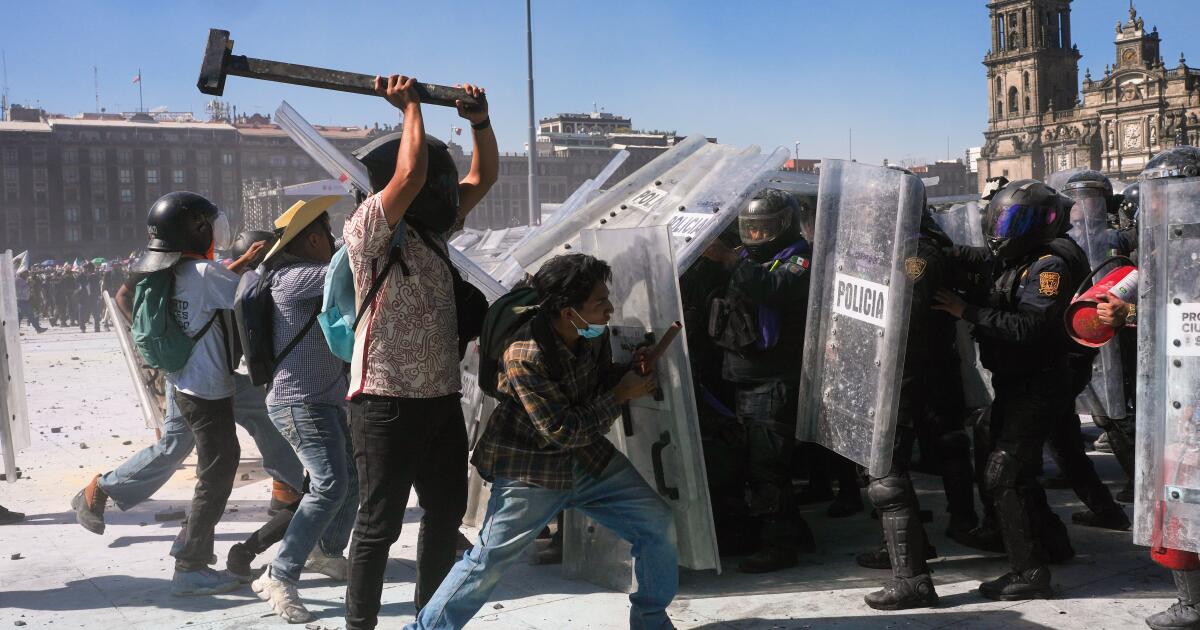MEXICO CITY — A weekend protest march convened to highlight the concerns of Mexico’s Generation Z has instead dramatized deep political divisions extending well beyond the needs of young Mexicans.
The mostly peaceful demonstration in downtown Mexico City on Saturday culminated in several hours of clashes when small groups of protesters battled with phalanxes of riot police deployed to protect the National Palace in Mexico City’s central square, or zócalo.
In the aftermath of the protests, Mexico’s leftist President Claudia Sheinbaum accused right-wing opponents of hijacking the demonstration to provoke unrest and smear her government.
“A march that was supposedly called against violence utilized violence,” Sheinbaum told reporters Monday.
But opposition leaders and other critics said the march reflected deep concern about alleged cartel infiltration in the government and charged that police brutalized young protesters.
Among those who noticed the chaotic scenes from Mexico was President Trump, who, in Oval Office comments to the press on Monday, again raised the provocative specter of U.S. strikes on cartel targets in Mexico. The country is a major production site for fentanyl, amphetamines and other synthetic drugs bound for the U.S. market, and a transport corridor for South American cocaine.
“I looked at Mexico City over the weekend. There’s some big problems there,” Trump said. “Let me just put it this way: I am not happy with Mexico.”
Asked if he would contemplate U.S. attacks on cartel targets in Mexico, Trump responded: “Would I launch strikes in Mexico to stop drugs? It’s OK with me. Whatever we have to do to stop drugs.”
Trump has charged that Mexico is “run by the cartels,” though he has praised Sheinbaum as a “very brave woman.”
Sheinbaum has denied that cartels control Mexico. She has maintained a cooperative attitude with Trump on two contentious binational issues — drug trafficking and tariffs — but has said Mexico would not yield its sovereignty and agree to U.S. strikes.
Saturday’s march — one of many similar protests across Mexico on that day — was originally called in support of Generation Z, after related demonstrations in Nepal and Morocco. Young people worldwide have decried a lack of economic and educational opportunities.
But the rally in Mexico City became mostly a march against what many participants labeled the leftist “narco-government” of Sheinbaum and her ruling Morena party
Many protesters hoisted banners declaring: “I am Carlos Manzo,” after the mayor of the western city of Uruapan, who was assassinated this monthin a shooting that authorities have blamed on organized crime.
Manzo had accused Sheinbaum’s government of coddling criminals. Supporters of his so-called “White Hat” movement — after the popular mayor’s signature sombrero — took to the streets of Uruapan and other cities in Michoacán state this month by the tens of thousands to demand a crackdown on organized crime. Backers of the growing movement were also major participants in Saturday’s march in Mexico City.
In the aftermath of the march, Sheinbaum’s opponents accused her government of repressing dissent.
“They brutalized young people who only want a better Mexico,” Alejandro Moreno, president of the opposition Institutional Revolutionary Party, charged on X. “They beat them because they are scared. They know that the power of an organized people is stronger than a cowardly narco-regime.”
Mexican authorities denied allegations of brutality and said that at least 60 police officers were injured.
A small minority of protesters, many wearing ski masks, tossed stones, bottles, fireworks and other improvised weapons at police. Police used both physical force and volleys of tear gas to push them back. Each side blamed the other for igniting the melees.
“They wanted to generate this idea: ‘Chaos in Mexico!’ “ charged Sheinbaum, noting how the images of the clashes received widespread domestic and international attention in the press and social media.
The president called for an investigation of the violence, which, she said, was funded by her opponents. She vowed that authorities would also investigate any allegations of police brutality. The great majority of protesters, she said, were nonviolent.
Authorities said 17,000 marchers took place in Saturday’s demonstration. The opposition said the number was much higher.
Opponents of Sheinbaum’s government have vowed additional protests. But many experts doubt that a deeply fractured opposition could do much to loosen Morena’s stranglehold on power.
Sheinbaum’s predecessor and mentor, ex-President Andrés Manuel López Obrador, faced much larger street demonstrations during his time in office, along with allegations of ties of drug traffickers. But neither seemed to dent his widespread popularity.
Polls have shown Sheinbaum, who just completed the first year of a six-year term, with 70%-plus approval ratings. Her Morena party, with strong backing from poor and working-class Mexicans who have benefited from minimum-wage increases and social welfare programs, retains firm control of congress, the courts and most statehouses across Mexico.
Security remains the major concern of most Mexicans, polls show, even as the president has touted decreases in homicides and other violent crimes. Sheinbaum has launched a crackdown on organized crime that has seen thousands of suspects arrested — including dozens expelled to face justice in U.S. courts.
Special correspondent Cecilia Sánchez Vidal in Mexico City contributed to this report.




